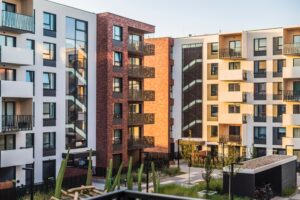More and more products, such as Alexa and Google Voice, have become normalized in the market and branded as products that help consumers with their daily home tasks. According to TechCrunch, voice assistant use will triple to eight billion by 2023.One-third of current renters use these smart systems in their current living space, and some refuse to rent an apartment or multifamily property that doesn’t possess any smart home features.
With the rise of smart home features has also brought along the rise of concerns for data breaches and privacy. Renters want to know that transactions, such as online rental payments, are safe and won’t take important and personal information. Renters also want assurance that there won’t be data breaches or hackers able to find personal information while handling online transactions as well.
It’s important for property managers to consider an online system that protects their residents’ privacy while also offering online options, like rental payments or lease signings on the web, that make both residents and property manager’s lives easier. It is also important that property managers research and understand their current smart home features, so that they know the current privacy policies as well as how to elevate their residents’ current living spaces.
 As the world continues to change in a COVID-19 world, more and more renters are choosing how they move and choose their next place to live in. With changes in moving come new trends in what renters are looking for. According to a recent study conducted by the National Multifamily Housing Council (NMHC) and Grace Hill 2022 Renter Preferences Survey report, twenty-five percent of renters moved in the past eighteen months, and seventy percent predict to be teleworking the same amount or more moving forward.
As the world continues to change in a COVID-19 world, more and more renters are choosing how they move and choose their next place to live in. With changes in moving come new trends in what renters are looking for. According to a recent study conducted by the National Multifamily Housing Council (NMHC) and Grace Hill 2022 Renter Preferences Survey report, twenty-five percent of renters moved in the past eighteen months, and seventy percent predict to be teleworking the same amount or more moving forward. With 2022 ready to come in just a few days, property managers and the real estate are now looking at how to attract new renters for the upcoming year. One important demographic property managers are looking to attract is Gen Z. As the first group in history to be raised by the digital world, Gen Z renters are used to growing up surrounded by social media, research, and the newest innovations in technology at their fingertips.
With 2022 ready to come in just a few days, property managers and the real estate are now looking at how to attract new renters for the upcoming year. One important demographic property managers are looking to attract is Gen Z. As the first group in history to be raised by the digital world, Gen Z renters are used to growing up surrounded by social media, research, and the newest innovations in technology at their fingertips. With the COVID-19 pandemic entering its third year, trends are changing within the real estate and leasing industries. The environments in which people live, work, and learn have changed drastically with the implementation of working or earning a degree online at home. Students and the workforce alike realize the change to remote work, whether permanently or with a hybrid setting, results in having to make big decisions on their living space. The current workforce also considers factors such as location, cost of rent, and how much storage area they’ll need as they prepare to make their next big move.
With the COVID-19 pandemic entering its third year, trends are changing within the real estate and leasing industries. The environments in which people live, work, and learn have changed drastically with the implementation of working or earning a degree online at home. Students and the workforce alike realize the change to remote work, whether permanently or with a hybrid setting, results in having to make big decisions on their living space. The current workforce also considers factors such as location, cost of rent, and how much storage area they’ll need as they prepare to make their next big move. From starting as a sparsely used add-on feature to becoming an absolute necessity for rental housing,
From starting as a sparsely used add-on feature to becoming an absolute necessity for rental housing,  The appeal for 3D or virtual tours had been growing for renters since 2018. 3D and virtual tours give potential renters the option to view a possible living space without having to travel or take time out of their busy days for an in-person tour. In 2020, the preference for 3D and virtual touring due to the beginning of the COVID-19 pandemic. According to a
The appeal for 3D or virtual tours had been growing for renters since 2018. 3D and virtual tours give potential renters the option to view a possible living space without having to travel or take time out of their busy days for an in-person tour. In 2020, the preference for 3D and virtual touring due to the beginning of the COVID-19 pandemic. According to a  Another one of COVID-19’s many effects on the world was changing the work landscape. Those in the workforce now have the option to work fully remote or in a hybrid setting that includes going into the office 2-3 times per week.
Another one of COVID-19’s many effects on the world was changing the work landscape. Those in the workforce now have the option to work fully remote or in a hybrid setting that includes going into the office 2-3 times per week.  Thanks to the COVID-19 pandemic, more and more apartment property companies are
Thanks to the COVID-19 pandemic, more and more apartment property companies are  As Millennials continue to put off becoming homeowners and Gen Z begins to enter the workforce, renting becomes more and more popular with these groups. In order to attract young renters, it is important to understand what their ideal rental property looks like. To know what factors to invest into, here are the top seven amenities Millennials and Gen Z renters look for in their future living spaces:
As Millennials continue to put off becoming homeowners and Gen Z begins to enter the workforce, renting becomes more and more popular with these groups. In order to attract young renters, it is important to understand what their ideal rental property looks like. To know what factors to invest into, here are the top seven amenities Millennials and Gen Z renters look for in their future living spaces: Modern apartments now include amenities from communal treehouses to sky terraces with firepits. While this may seem over the top, it shows a shift in what residents and developers look for in high-rise living.
Modern apartments now include amenities from communal treehouses to sky terraces with firepits. While this may seem over the top, it shows a shift in what residents and developers look for in high-rise living.